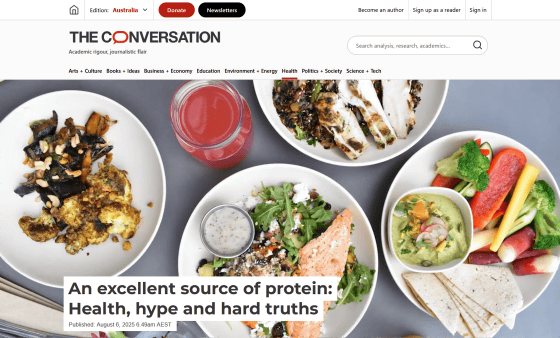Experts answer questions such as 'Why is protein important?', 'How much protein do you need per day?', and 'What are the best sources of protein?'

In recent years, the idea that 'protein intake is necessary for health' has become widespread, and high-protein drinks and energy bars are increasingly appearing on supermarket and convenience store shelves. However, many of the advertising claims to the importance of protein are driven by commercial needs rather than medical needs. Dr.
An excellent source of protein: Health, hype and hard truths
https://theconversation.com/an-excellent-source-of-protein-health-hype-and-hard-truths-259984

◆Why is it important to consume protein?
Protein is one of the three macronutrients needed in large amounts, along with carbohydrates and fats. While carbohydrates and fats are primarily used as a source of energy, protein plays a more structural and functional role in building and repairing body tissues, boosting immunity, and producing molecules such as enzymes and hormones.
Proteins are made up of amino acids, and although humans can produce some amino acids in their bodies, nine amino acids cannot be obtained in sufficient amounts except through food. These are called ' essential amino acids ' and must be consumed daily through the diet.
Furthermore, while carbohydrates and fats can be stored in the body, and even if intake is reduced, the body can use the stored reserves to some extent, protein does not have a dedicated storage system. Therefore, protein must be replenished regularly through food, and if protein intake is reduced due to fasting or serious illness, the body breaks down its own muscles to release the necessary amino acids. 'This is a last resort, and it shows how essential protein is for survival,' said McKendry.

◆How much protein do you need per day?
The amount of protein a person should consume per day varies depending on factors such as age and physical activity level, but the recommended daily protein intake for almost everyone is 0.8g per kg of body weight. In other words, a person weighing 60kg should aim to consume 48g of protein per day.
It's important to note that these recommendations are intended to prevent protein deficiency, not to promote optimal health. For example, older adults with reduced nutrient utilization, athletes who need more protein for muscle repair and growth, and pregnant women who need to nourish their unborn baby may require as much as 1.2-2g of protein per kg of body weight.
Some people may be concerned that eating too much protein is bad for their health, but McKendry explains that for generally healthy people, increasing their protein intake won't cause kidney failure, cancer, or osteoporosis.

◆When should you take protein?
Some well-known influencers claim that 'you can't build muscle unless you take in protein immediately after exercise' or 'postmenopausal women need to take in protein within 45 minutes of exercise.' However, there is no evidence to support this claim,
There's at least 24 hours after exercise for protein to be absorbed, so there's no need to guzzle a protein shake immediately after exercise. 'As long as you're getting enough protein every day, feel free to consume it on a schedule that fits your daily routine,' McKendry advises.
From a diet perspective, increasing protein intake at each meal can make you feel fuller, which may reduce the likelihood of overeating or craving sweets. Furthermore, people who diet or use appetite-suppressing weight-loss drugs lose muscle mass as they rapidly lose weight, but it has been suggested that actively consuming protein can help prevent this loss.

What is the best source of protein for your body?
Protein is found in a wide range of foods, from animal-based foods like meat, fish, eggs, and dairy to plant-based foods like beans, whole grains, nuts, seeds, and some vegetables. Online claims are often made that animal-based proteins are better for supporting muscle growth.
While it's true that animal protein contains more essential amino acids and is more bioavailable, meaning it tends to be easier for the body to absorb and use, it's still possible to get all the important essential amino acids from plant protein by eating a balanced and varied diet.
While various 'high-protein foods' such as protein shakes and energy bars are now available in supermarkets and convenience stores, McKendry advises, 'My advice is to eat a balanced diet that includes a variety of foods and prioritizes protein. This is roughly the same principle as the Dietary Guidelines. Whether your protein comes from animal or plant sources, aim to fill about a quarter of your plate or bowl with protein for breakfast, lunch, and dinner.'
in Science, Food, Free Member, Posted by log1h_ik